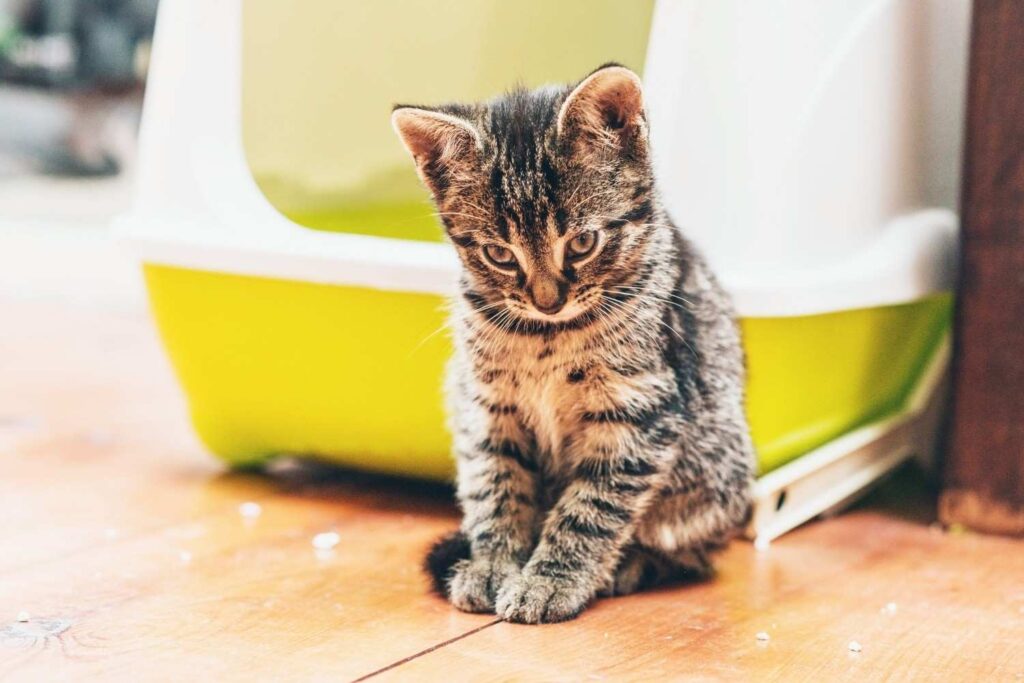If you’re a cat owner, you might have faced a frustrating situation: finding your cat has peed on your belongings. This can be confusing and stressful. You might wonder, “Why is my cat peeing on things?” or “Why does my cat keep peeing on my things?” In order to assist your pet in getting back on track, it is imperative that you comprehend the causes of this behavior. Let’s explore the common causes of inappropriate urination in cats and how to solve the problem.

Medical Reasons
Your cat’s health should be your top priority. Urinating outside of the litter box occasionally indicates a health issue. The following prevalent health conditions could be the source of this behavior:
1. Urinary Tract Infection (UTI)
A urinary tract infection can make it painful for your cat to pee. If your cat associates the litter box with pain, they might choose to urinate elsewhere, like on your clothes or bed.
2. Kidney Problems
Cats with renal illness may urinate more frequently and drink more water than usual. This increased need to pee can lead to accidents around the house.
3. Diabetes
Like kidney disease, diabetes can cause frequent urination. If your cat seems to be peeing more than usual, it might be time to see the vet.
4. Cystitis
Cystitis is an inflammation of the bladder that can lead to frequent urination. If your cat is straining to pee or seems uncomfortable,
this could be the issue.
If you think your cat’s peeing is due to a medical issue, it’s essential to take them to the vet. A professional can diagnose any problems and suggest the right treatment.
Behavioral Reasons
If your cat has a clean bill of health, the next step is to look at their behavior. Cats can be sensitive creatures, and several factors might lead to inappropriate urination:
1. Stress and Anxiety
Cats can get stressed easily. Changes in their environment, like moving to a new home, getting a new pet, or even loud noises, can cause anxiety. When stressed, some cats may start peeing on your things as a way to cope.
2. Territory Marking
Cats are territorial animals. They may urinate to mark their territory, especially if they feel threatened by a new pet or person in the house.
3. Litter Box Issues
If your cat doesn’t like their litter box, they might refuse to use it. Here are some reasons why they may avoid it:
Dirty Litter Box: Cats are clean animals. If the litter box is dirty or smelly, your cat may look for other places to go.
Wrong Type of Litter: Some cats are very picky about their litter. If you’ve recently changed the type, your cat might not like it.
Litter Box Location: If the litter box is in a busy or noisy area, your cat may not feel safe using it.
Too Few Litter Boxes: The rule of thumb is to have one litter box per cat, plus one extra. If you have multiple cats and not enough boxes, this can lead to accidents.
What to Do About It
Now that you understand some reasons your cat might be peeing on things, let’s look at how to solve the problem. Here are some steps to take:
1. Visit the Vet
If you suspect your cat has a medical issue, the first step is to take them to the vet. A professional can determine if there’s a health problem and recommend treatment.
2. Reduce Stress
If stress is the culprit, try to create a calm environment for your cat. This can include:
Providing a Safe Space: Make a quiet area where your cat can retreat if they feel overwhelmed. This can be a cozy bed or a favorite spot where they feel safe.
Using Pheromone Diffusers: Products like Feliway release calming pheromones that can help reduce your cat’s anxiety.
3. Improve the Litter Box Situation
Make sure your cat’s litter box is clean, accessible, and comfortable. Here are some tips:
Keep It Clean: Scoop the litter box daily and change the litter regularly. Cats prefer a clean bathroom.
Try Different Litters: Experiment with various types of litter to find one your cat likes best. Some cats prefer clumping litter, while others might like crystal or natural options.
Change the Location: Ensure the litter box is in a quiet, low-traffic area where your cat can feel safe while using it.
Provide Enough Boxes: If you have multiple cats, make sure you have enough litter boxes for everyone.
4. Positive Reinforcement
When your cat uses the litter box, reward them with treats or praise. This encourages good behavior and helps reinforce the idea that the litter box is the right place to go.
5. Clean Accidents Properly
If your cat pees on your belongings, clean the area thoroughly with an enzymatic cleaner. This type of cleaner breaks down the urine and removes the scent, which can help prevent your cat from returning to the same spot.
Conclusion
Finding your cat peeing on your things can be a frustrating experience. However, understanding the reasons behind this behavior is the first step to solving the problem. Whether it’s a medical issue, stress, or litter box aversion, addressing the root cause will help your cat feel more comfortable and encourage them to use their litter box again.
If you’re looking for more helpful tips on cat care and behavior, visit Cattoptips for additional resources and insights. Remember, patience and understanding are key to helping your cat overcome this challenge!


